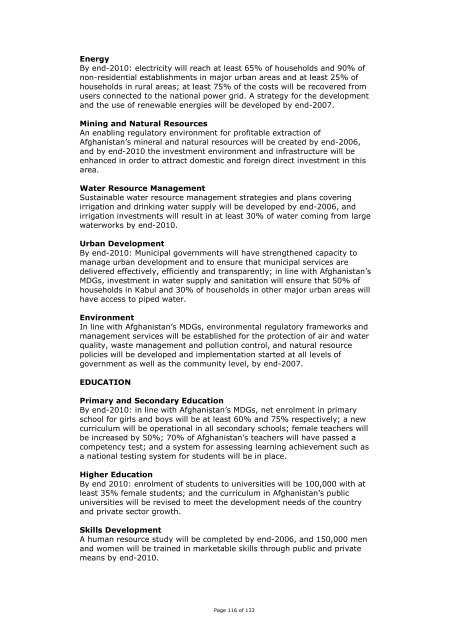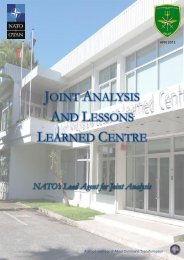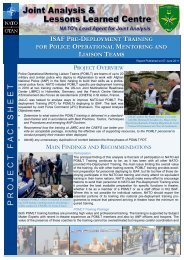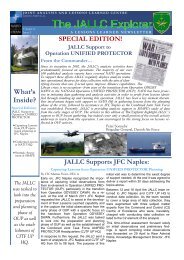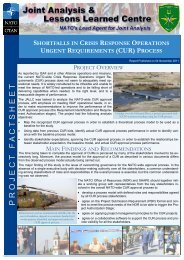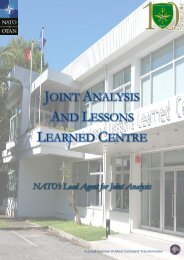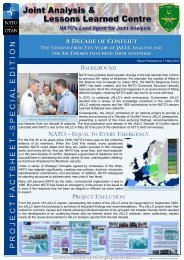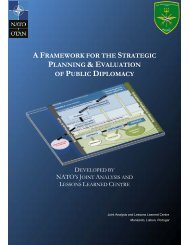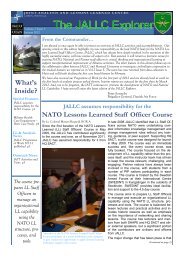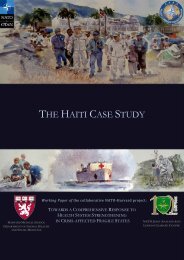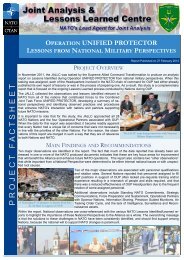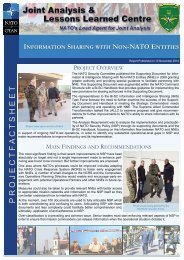Final evaluation Netherlands participation in ISAF 2006 - 2010
Final evaluation Netherlands participation in ISAF 2006 - 2010
Final evaluation Netherlands participation in ISAF 2006 - 2010
You also want an ePaper? Increase the reach of your titles
YUMPU automatically turns print PDFs into web optimized ePapers that Google loves.
EnergyBy end-<strong>2010</strong>: electricity will reach at least 65% of households and 90% ofnon-residential establishments <strong>in</strong> major urban areas and at least 25% ofhouseholds <strong>in</strong> rural areas; at least 75% of the costs will be recovered fromusers connected to the national power grid. A strategy for the developmentand the use of renewable energies will be developed by end-2007.M<strong>in</strong><strong>in</strong>g and Natural ResourcesAn enabl<strong>in</strong>g regulatory environment for profitable extraction ofAfghanistan’s m<strong>in</strong>eral and natural resources will be created by end-<strong>2006</strong>,and by end-<strong>2010</strong> the <strong>in</strong>vestment environment and <strong>in</strong>frastructure will beenhanced <strong>in</strong> order to attract domestic and foreign direct <strong>in</strong>vestment <strong>in</strong> thisarea.Water Resource ManagementSusta<strong>in</strong>able water resource management strategies and plans cover<strong>in</strong>girrigation and dr<strong>in</strong>k<strong>in</strong>g water supply will be developed by end-<strong>2006</strong>, andirrigation <strong>in</strong>vestments will result <strong>in</strong> at least 30% of water com<strong>in</strong>g from largewaterworks by end-<strong>2010</strong>.Urban DevelopmentBy end-<strong>2010</strong>: Municipal governments will have strengthened capacity tomanage urban development and to ensure that municipal services aredelivered effectively, efficiently and transparently; <strong>in</strong> l<strong>in</strong>e with Afghanistan’sMDGs, <strong>in</strong>vestment <strong>in</strong> water supply and sanitation will ensure that 50% ofhouseholds <strong>in</strong> Kabul and 30% of households <strong>in</strong> other major urban areas willhave access to piped water.EnvironmentIn l<strong>in</strong>e with Afghanistan’s MDGs, environmental regulatory frameworks andmanagement services will be established for the protection of air and waterquality, waste management and pollution control, and natural resourcepolicies will be developed and implementation started at all levels ofgovernment as well as the community level, by end-2007.EDUCATIONPrimary and Secondary EducationBy end-<strong>2010</strong>: <strong>in</strong> l<strong>in</strong>e with Afghanistan’s MDGs, net enrolment <strong>in</strong> primaryschool for girls and boys will be at least 60% and 75% respectively; a newcurriculum will be operational <strong>in</strong> all secondary schools; female teachers willbe <strong>in</strong>creased by 50%; 70% of Afghanistan’s teachers will have passed acompetency test; and a system for assess<strong>in</strong>g learn<strong>in</strong>g achievement such asa national test<strong>in</strong>g system for students will be <strong>in</strong> place.Higher EducationBy end <strong>2010</strong>: enrolment of students to universities will be 100,000 with atleast 35% female students; and the curriculum <strong>in</strong> Afghanistan’s publicuniversities will be revised to meet the development needs of the countryand private sector growth.Skills DevelopmentA human resource study will be completed by end-<strong>2006</strong>, and 150,000 menand women will be tra<strong>in</strong>ed <strong>in</strong> marketable skills through public and privatemeans by end-<strong>2010</strong>.Page 116 of 133


